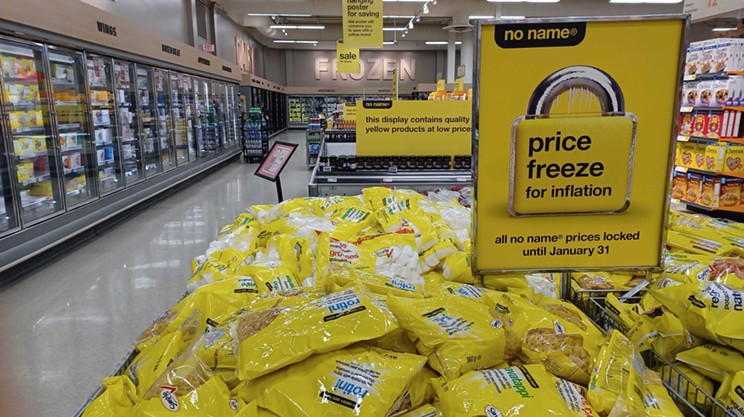The average Haligonian’s grocery bill rose by 10.5% in 2022, according to the latest Canada’s Food Price Report. That’s more than any year since the 1980s—and if food researchers’ forecasts are correct, we’re in for another 5-7% jump in 2023. Those figures come from a collaborative report by researchers at Dalhousie University, the University of Guelph, UBC and the University of Saskatchewan that uses historical data, machine learning and predictive analytics. And based on Coast readers’ responses, the price surge has many Haligonians feeling the pinch.
This week, we asked our 33,000 Coast Daily newsletter readers (it’s free; subscribe here) how food inflation has changed their shopping habits. We put that same question to our 50,000 Instagram followers and 96,000 Twitter followers.
One in three respondents on both our Twitter and Instagram polls replied that they’re “struggling” with the inflated cost of groceries, and more than half of our poll respondents across the board mentioned they were doing “a little less splurging.” For some, the choices are starker: Earlier this week, Northwood resident Judy Bonnell told CBC News that she now has to choose between spending on groceries and visiting her daughters in Cape Breton. As recently as November, Global News reported that both Dalhousie and Mount Saint Vincent universities were seeing more students looking to access their food banks.
For many Coast poll respondents, the rise in food costs has meant stretching meals however possible—and also, where possible, shopping strategically.
“Nothing is wasted in cooking,” writes Coast reader Sharon Dickson, who adds “the 50% off sticker is my friend now.” Leftovers, Dickson says, get used in soup and stews. Whatever can be bought on sale and frozen is stored in the freezer. Fellow Coast reader Sandra McKenzie writes that she’s begun juicing overripe oranges and making applesauce from old apples—“using up all fresh produce, even if it’s not at its best.” Another Coast reader responds that they’re revisiting their pantry shelves and making meals from scratch: “I always make 'planovers', a larger quantity for later meals.”
Also, @twitcoast was asking in their daily email for photos of $100 worth of groceries. This was $97 at Superstore in Elmsdale. Tea was by far the most expensive item, followed by the flat of eggs. pic.twitter.com/LXaKoOTTJt
— Sarah White (@sarahwhitehfx) January 26, 2023
For some Coast readers, the rise in prices has led to a change in their diet. Ronald Gilkie says he’s cut back on the amount of meat he buys. So has reader Maureen Shebib—but it’s come at a cost to her health.
“I am a senior on a fixed income,” Shebib writes, adding that she has “health restrictions that affect what I can eat.” Lean meats and fish are best, she says, along with fruit and “some vegetables.” But recent sticker hikes have made finding those groceries at an affordable price “almost impossible.”
“I have had to eat less in variety and quantity,” Shebib adds. “Plant based foods and things like legumes (beans etc) are not an option. In short, [I] can no longer afford to eat in the ways necessary to keep my GI issues under control and maintain [my] physical and mental state.”
Loblaw ends price freeze, draws criticism for ‘profiteering’
Relief at grocery checkout doesn’t appear to be coming anytime soon. This week, the Real Atlantic Superstore and its parent company, Loblaw, ended a three-month price freeze on its budget-tier No Name products.
The price freeze was initially presented in October as Loblaw—a grocery company whose profits rose by 30% in 2022’s third quarter—“trying to do what we can to help.” In recent days, however, the food giant has sparked controversy for pulling the plug on its price freeze and embarking on a Twitter reply spree where it shifted the blame for food inflation on the “manufacturers who make the products [and] are charging more for them.” (Left unmentioned by Loblaw? Its founders and owners, the Weston family, happen to also own several of those manufacturers—they control the brands President's Choice, No Name and Joe Fresh, in addition to bakery brands Wonder, Country Harvest, D'Italiano, Ready Bake and Gadoua.)
In early December, representatives from both Loblaw and Empire testified in front of the House of Commons agriculture committee after accusations of artificially inflating food prices. Loblaw’s senior vice-president of retail finance, Jodat Hussain, has denied those claims.
“We are not taking advantage of inflation to drive profits," Hussain said.
Canada’s Food Price Report pins rising food prices on a number of factors, including a global climate crisis, “supply change disruptions,” carbon taxes, “geopolitical climates” and rising transportation costs.
—With files from Matt Stickland


